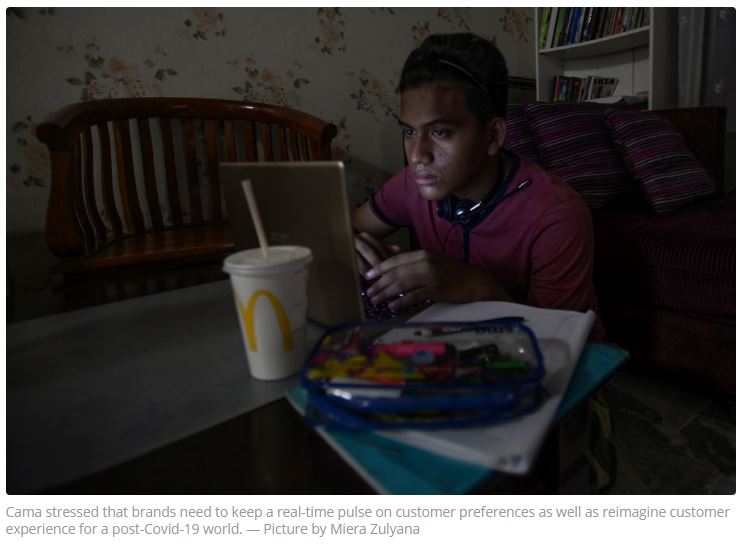Malaysians like using e-commerce platforms but want better service, study finds
KUALA LUMPUR, Sept 24 — A new multinational study has revealed that Malaysians are on the whole reasonably satisfied with their e-commerce platforms and providers, but feel more can be done to improve their service.
Singapore-based social research agency Blackbox Research and consumer intelligence platform Toluna said the Covid-19 pandemic has led to a spike in online spending, with 59 per cent of those surveyed now spending more online, and the total online spend for the average Malaysian consumer increasing by 33 per cent.
Blackbox’s international commercial director Yashan Cama said close to half of consumers, or 43 per cent, have indicated they are less than satisfied with their digital commerce experience, citing delivery time, delivery costs and product prices as their top three concerns.
“When it comes to balancing brand use and brand satisfaction, Shopee emerged as the strongest among e-commerce players. The report findings revealed that it not only achieved an 83 per cent market share amongst respondents, it had the second highest satisfaction rating,” he said in a statement.
Similarly, despite only ranking as the third-most used platform, Grab had the highest brand satisfaction.
However, in contrast, although 60 per cent of respondents use Lazada, its performance was only rated average when it comes to consumer satisfaction.
“Some of the factors behind these brands’ popularity include their focus on localising their offering, as well as tapping into the purchase motivations and behavioural ticks of consumers in Malaysia, for example leveraging celebrity endorsements.
“The reception towards brands like Grab and Lazada demonstrated that scale of market usage does not necessarily translate to customer experience, as with growth comes at the cost of greater scrutiny from consumers,” Cama said.
He said even Shopee’s popularity may begin to wane should its service quality slip, before stressing the need for platforms to always be on the edge.
“Consumers are demanding and discerning, an experience they have in one industry they expect from another, so this expectation is only going to increase.
“With 5G technology on the verge of transforming platform capabilities, current market leaders may wake to find themselves no longer at the front of that queue if they do not address concerns and work to deliver a more frictionless experience,” Cama said.
The study’s other findings also looked at identifying key trends as a result of Covid-19 including a considerable shift in consumer sentiment towards local brands, in which 86 per cent of respondents said they were more likely to support local brands in the future, driven by a desire to strengthen their local communities and economy.
When asked, national oil and gas corporation Petronas was commonly cited by respondents as the most pleasing and impressive brand throughout the pandemic.
“International might be on the verge of becoming a dirty word. The resurgence in national pride can also be attributed to consumers looking to support their own economy, and they are letting their spending dollar speak for itself by choosing to shop local.
“This coincides with the government’s efforts to increase the promotion of the ‘Buy Malaysian Products’ campaign this year, with initiatives such as creating ‘shopping streets’ around the country dedicated for traders to promote and sell local products,” he said.
Cama added that international companies seeking to remain competitive will need to reassess their portfolios and seriously consider how they can localise their brands to reflect the values that matter most to Malaysian consumers.
Another finding has also revealed that up to 94 per cent of respondents are happy working from home, with the majority not missing going to the movies or shopping at retail outlets.
“This will have a tangible impact on future consumer behaviour, as they are not rushing back to their old habits, so this new sense of life revolving around the home hub means companies need to rethink how they build this into the consumer experience in future.
“These changes go right to the heart of consumer behaviour and require innovative approaches across the board from property developers, landlords, employers, through to retailers. If businesses fail to adapt, the stakes are high. Any negative interaction with a brand — particularly in times of crisis — can have longstanding effects on his or her sense of trust and loyalty,” he said.
Cama stressed that brands need to keep a real-time pulse on customer preferences as well as reimagine customer experience for a post-Covid-19 world, with care and connection at the forefront if they want to build their resilience.
“Organisations today have an obsession with data. This is not a bad thing. But only by choosing to value customers as more than digital units or data points, will brands emerge successful,” he said.
Blackbox and Toluna’s study, titled “Into the Light: Understanding What has Changed for the Asean Consumer During Covid-19”, polled 4,780 consumers across Singapore, Malaysia, Indonesia, Vietnam, Thailand and the Philippines.
Source: https://www.malaymail.com/news/malaysia/2020/09/24/malaysians-like-using-e-commerce-platforms-but-want-better-service-study-fi/1906051


 Thailand
Thailand




